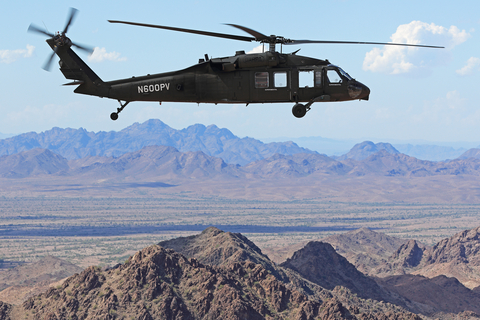Sikorsky’s Optionally Piloted BLACK HAWK helicopter with the MATRIX autonomy system demonstrates contested logistics resupply without humans on board at U.S. Army’s Yuma Proving Ground, October 2022. The MATRIX system forms the core of DARPA’s ALIAS (Aircrew Labor In-cockpit Automation System) project, designed to exponentially improve the flight safety and efficiency of rotary and fixed-wing aircraft. Rain and Sikorsky will collaborate to demonstrate the capability of autonomously flown helicopters to attack wildland fires at the earliest stage. Photo by Sikorsky, a Lockheed Martin company.
Rain, a leader in aerial wildfire containment technology, and Sikorsky, a Lockheed Martin company, announced today at the UP.Summit a collaboration to explore how Sikorsky’s MATRIX™ autonomy suite operating with Rain’s Wildfire Mission Autonomy System can launch uncrewed helicopters to drop water on wildfires within minutes of detection.
“Combining Sikorsky’s demonstrated mature vehicle autonomy system with Rain’s early response capability will show how an uncrewed BLACK HAWK® or FIREHAWK® helicopter can quickly take off, fly to a suspected ignition, and drop water to suppress a wildfire in its incipient stage with no human onboard,” said Rain CEO Maxwell Brodie. ”Ultimately, Rain envisions equipping fire agencies with the capability to strategically position a future fleet of firefighting aircraft capable of receiving and carrying out mission commands.”
This collaborative effort will use Rain's Wildfire Mission Autonomy System to upload mission commands to Sikorsky’s Optionally Piloted BLACK HAWK helicopter with no crew on board for the fastest response time.
Brodie pointed to research showing that a 15-minute reduction in wildfire response times could generate $3.5 to $8.2 billion in economic benefits annually for the state of California alone.
Developed for more than a dozen years by Sikorsky Innovations, an advanced engineering group within Sikorsky, the MATRIX system combines a platform-agnostic software and hardware suite, including sensors, to ensure an aircraft flown with reduced crew or uninhabited can fly reliably and safely in low-level and obstacle-rich terrain. Even with no humans on board, an aircraft with the MATRIX system does not require a remote pilot or ground controller to command the mission via datalink, nor waypoints to navigate.
“MATRIX executes a full mission plan by taking into account mission goals and constraints, aircraft performance, obstacles, weather, and topography,” said Igor Cherepinsky, Sikorsky Innovations director. “The system is fully integrated with the flight controls, allowing the aircraft to fly with high levels of autonomy in all environmental conditions. MATRIX is just one example, our predictive Firefighting Intelligence capabilities being another, of how Lockheed Martin is integrating 21st Century Security technology to help first responders fight wildfires faster and more effectively.”
To date, MATRIX has been tested on 10 different rotary and fixed-wing aircraft and can be applied to existing or new build applications.
Rain integrates with early wildfire detection networks to rapidly dispatch autonomous aircraft. Onboard the aircraft, the Rain Wildfire Mission Autonomy System identifies and locates wildfire, develops a suppression strategy, and plans flight path and drop timing to enable on-target delivery of suppressant. Throughout operations, the Wildfire Mission Autonomy System shares intelligence and plans, providing firefighters with situational awareness and oversight of the mission to ensure safety and coordination.
Rain and Sikorsky’s collaboration will demonstrate autonomous capabilities to enable firefighting helicopters to be pre-positioned in remote locations according to wildfire risk. Operating uncrewed, and deployable 24/7, the integrated offering would provide fire agencies the ability to rapidly respond to ignitions in hard-to-access regions in varied terrain, supporting fire agencies with new tools in their mission to prevent catastrophic wildfires in the areas they serve.
ABOUT RAIN
Rain, a leader in aerial wildfire containment technology, is helping fire agencies more rapidly suppress wildfires during the earliest stages of ignition, before they grow out of control. Rain adapts autonomous aircraft with wildfire intelligence to rapidly perceive, understand, and suppress wildfires, which enables numerous aircraft to be prepositioned in remote locations resulting in accelerated response time. Developed in tandem with fire professionals, Rain is a privately held company headquartered in Alameda, California. Visit www.rain.aero for more information.
About UP.Summit
UP.Summit is an annual, invitation-only gathering of the world’s most innovative minds rethinking the future of transportation. Some of the most impactful investors, entrepreneurs, and leaders in policy, defense, transportation and mobility companies gather at the summit each year with the goal of moving people and goods in cleaner, faster, safer, and at lower-cost ways - on the ground, in the air, on the sea, and in space. UP.Summit was founded in 2017 and is jointly organized by UP.Partners, Tom and Steuart Walton, and Ross Perot Jr.






